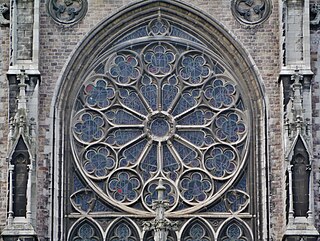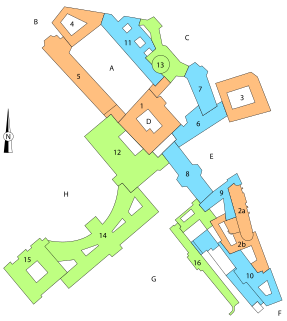
The term stained glass refers to coloured glass as a material and to works created from it. Throughout its thousand-year history, the term has been applied almost exclusively to the windows of churches and other significant religious buildings. Although traditionally made in flat panels and used as windows, the creations of modern stained glass artists also include three-dimensional structures and sculpture. Modern vernacular usage has often extended the term "stained glass" to include domestic lead light and objets d'art created from foil glasswork exemplified in the famous lamps of Louis Comfort Tiffany.

Peter Carl Fabergé, also known as Karl Gustavovich Fabergé, was a Russian jeweller best known for the famous Fabergé eggs made in the style of genuine Easter eggs, but using precious metals and gemstones rather than more mundane materials. He was one of the sons of the founder of the famous jewelry legacy House of Fabergé.

Carl Djerassi was an Austrian-born American chemist, novelist, playwright and co-founder of Djerassi Resident Artists Program with Diane Wood Middlebrook. He is best known for his contribution to the development of oral contraceptive pills, nicknamed the father of the pill.

Wiener Neustadt is a city located south of Vienna, in the state of Lower Austria, in northeast Austria. It is a self-governed city and the seat of the district administration of Wiener Neustadt-Land District. The city is the site of one of the world's oldest military academies, the Theresian Military Academy, which was established by Empress Maria Theresa of Austria in 1752 to train officers for the Austrian army.

Tuttlingen is a town in Baden-Württemberg, capital of the district Tuttlingen. Nendingen, Möhringen and Eßlingen are three former municipalities that belong to Tuttlingen. Tuttlingen is located in Swabia east of the Black Forest region in the Swabian Jura.

The Hofburg is the official residence and workplace of the President of Austria and was formerly the principal imperial palace of the Habsburg dynasty. Located in the center of Vienna, it was built in the 13th century and expanded several times afterwards. It also served as the imperial winter residence, as Schönbrunn Palace was the summer residence.

The Museum of Military History – Military History Institute in Vienna is the leading museum of the Austrian Armed Forces. It documents the history of Austrian military affairs through a wide range of exhibits comprising, above all, weapons, armours, tanks, aeroplanes, uniforms, flags, paintings, medals and badges of honour, photographs, battleship models, and documents. Although the museum is owned by the Federal Government, it is not affiliated to the Federal museums but is organised as a subordinate agency reporting directly to the Ministry of Defence and Sports.

Wiener Zeitung is an Austrian newspaper. It is one of the oldest, still published newspapers in the world. It is the official publication used by the Government of the Republic of Austria for legally-required announcements, such as company registrations, and was also the official publishing body for laws and executive orders until 2004.
Eduard Schulte was a prominent German industrialist. He was one of the first to warn the Allies and tell the world of the Holocaust and systematic exterminations of Jews in Nazi Germany occupied Europe.

The House of Fabergé is a jewellery firm founded in 1842 in Saint Petersburg, Russia, by Gustav Faberge, using the accented name Fabergé. Gustav's sons, Peter Carl and Agathon, and grandsons followed him in running the business until it was nationalised by the Bolsheviks in 1918. The firm was famous for designing elaborate jewel-encrusted Fabergé eggs for the Russian Tsars, and for a range of other work of high quality and intricate detail. In 1924, Peter Carl's sons Alexander and Eugène Fabergé opened Fabergé & Cie in Paris, making similar jewellery items and adding the name of the city to their rival firm's trademark, styling it FABERGÉ, PARIS.

Carl Almquist was a Swedish-born stained-glass artist whose professional life was spent entirely in Britain. He was a pupil of Henry Holiday and became one of the two chief designers for the well-known Lancaster firm of Shrigley and Hunt. He was in large measure responsible for establishing their late Pre-Raphaelite or Aesthetic style. Though largely neglected by 20th-century art historians he has more recently been acclaimed as a genius, and as one of the leading late-Victorian stained-glass designers.

Schweighofer was a piano manufacturer from Vienna, Austria.

The Merck family is a German family of industrialists and bankers, known for establishing the world's oldest pharmaceutical company Merck, its American former subsidiary Merck & Co. (MSD), which is now an independent company, as well as the Hamburg merchant bank H. J. Merck & Co. The family still owns the majority of the pharmaceutical company Merck.
The Kokomo Opalescent Glass Works of Kokomo, Indiana, is the oldest manufacturer of hand cast, rolled cathedral and opalescent glass in America, and the oldest manufacturer of opalescent glass in the world. In continuous operation since 1888, it was founded by Charles Edward Henry, who was relocating his existing stained glass manufacturing business from New Rochelle, New York. KOG has long been an important supplier to the American stained glass industry, including documented sales to Louis Comfort Tiffany, and in 1889, KOG won a gold medal at the Paris World Exposition for their multi-colored window glass.

The Glass House building was a "purpose-built stained-glass studio and workshop" for stained glass artists in Fulham, London. Having gone into partnership in 1897, Mary Lowndes and Alfred Drury had The Glass House built in 1906 for use by independent stained-glass artists.
Edgar Miller was an American designer, painter, craftsman, master woodcarver and one of the nation's foremost stained-glass designers. He could sculpt and draw, and he was considered a pioneer in the use of graphic art in advertising. In the 1920s, he was called “the blond boy Michelangelo”; in the 1930s, “a new luminary” by Architecture Magazine; in the 1940s, "one of the most versatile artists in America.” By the 1950s, he was the go-to guy for the nation's most successful industrial designers.

Sommerhuber is a traditional ceramics producer from Steyr city, Austria founded in 1491. It produces tiles for tiled stoves and tile chimneys and the heat ceramics for the spas. The company was an Imperial and Royal Warrant of Appointment.

Zwilling J. A. Henckels AG is a German kitchenware manufacturer based in Solingen, Germany. It is one of the largest and oldest manufacturers of kitchen knives, scissors, cookware and flatware, having been founded in June 1731 by Peter Henckels. The brand's namesake was Johann Abraham Henckels (1771–1850), who renamed the brand after himself under his leadership.

Ferdinand Julius Wilhelm Laufberger was an Austrian painter and etcher.
















